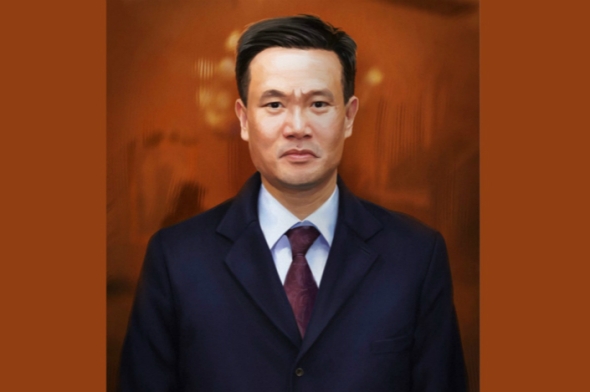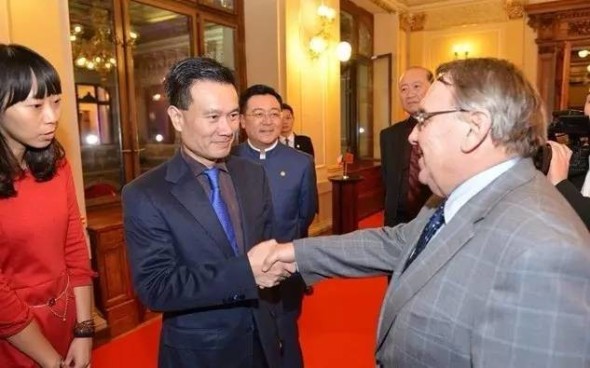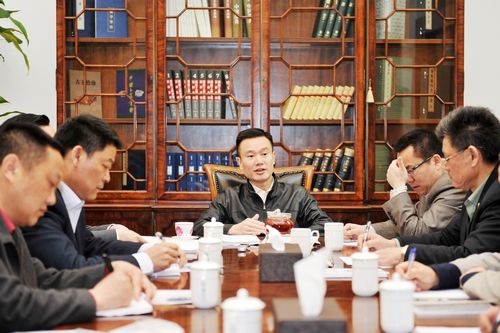Caixin’s investigation of CEFC and Chairman Ye Jianming
Posted: March 29, 2018 Filed under: Article summaries, China-Russia | Tags: CAIFC, Caixin, CEFC, Chairman Ye, Chen Qiutu, China CEFC Energy Company, China-Czech relations, China-Russia relations, Chinese journalism, Chinese journalists, Chinese media, Czech Republic, 陈秋途, 财新, Fujian Huaxin, Huaxin, Ji Tianqin, Rosneft, Sino-Czech relations, Su Weizhong, Ye Jianming, Zhang Qi, Zhou Lin, Zhuang Miaozhong, 华信, 华信能源有限公司, 叶简明, 季天琴 6 Comments
Chairman Ye Jianming, photographed by Caixin
On March 1, Caixin broke the news that Chairman Ye Jianming of the China CEFC Energy Co. has been detained by PRC authorities, and is under investigation for suspected criminal activity.
The company initially tried to refute this as “irresponsible” reporting, but investors opted to believe China’s leading investigative journalism outlet, and the company’s bonds dropped by 33% in a day.
But the party-state authorities’ ban on reporting about Chairman Ye and his empire of enterprise (documented here in 2017) remains in place, so Caixin‘s scoop was expunged from the PRC internet within hours.
The news was officially confirmed more than two weeks later, on March 19, when the Czech Republic sent a delegation to find out what was going on with its major source of foreign investment. The delegation was told that Chairman Ye, an advisor to Czech President Milos Zeman, was indeed “being investigated for a suspicion of breaking the law.”
CEFC was ranked 222nd in the Fortune 500 in 2017, and last year stunned the international energy industry by securing agreement to buy a $9 billion, 15% stake in Rosneft, Russia’s state oil giant.
Now the company’s future is as murky as its past.
Caixin reporter Ji Tianqin 季天琴 spent the most of 2017 interviewing CEFC executives, tracking down former associates of Ye, and tracing CEFC’s constellation of satellite companies through the financial records. And the crowning glory: she interviewed Ye himself twice, finding all manner of holes in the stories he told her.
Ji Tianqin is famous in Chinese journalism circles for her award-winning deep-dives addressing, among other things, Wang Lijun’s reign of terror in Chongqing. Considering the difficulty of being an investigative reporter in China today, she really ought to be famous outside China too.
This epic investigation into CEFC reveals how, through party and military connections, turnover figures massively inflated by fake trading, and relentless pursuit of international photo-ops and status symbols, Ye Jianming was able to sell domestic and foreign audiences a mostly vacuous narrative about his rising global energy and finance colossus.
Suffice to say, these revelations extend my record of getting some things right about CEFC, but not very many. I’ll leave that discussion for another post, as my purpose here is to urge China-watchers to invest the time in dipping into the 16,000-word translation below — and to please share thoughts on what it all means. I’d also welcome any translation corrections from people more familiar with financial and business terminology.
This is a spectacular work of Chinese investigative journalism that may contain some profound implications for understanding the PRC’s economy, politics and international relations.
~
Ye Jianming under investigation, what fate will befall CEFC?
叶简明被调查中国华信命运如何?
Caixin Online
By Ji Tianqin
Pistons, PX, petroleum, politics: checking in with Chairman Ye Jianming
Posted: January 17, 2017 Filed under: PRC News Portals, State media | Tags: CAIFC, CEFC, Chen Qiutu, China CEFC Energy Company, China Energy Fund Committee, China-Czech relations, Czech Republic, 陈秋途, Fujian Huaxin, General Political Department Liaison Department, Huahang Oil, Huaxin, Jian'ou, Lai Changxing, PLA General Political Department, SAIFC, Sino-Czech relations, Ye Jianming, 华信, 华信能源有限公司, 叶简明, 叶建明, 叶主席 6 Comments
The commanding gaze and handshake of CEFC / Huaxin Chairman Ye Jianming (source).
Since this blog last checked in with Ye Jianming in 2013, the youthful Chairman and his $40 billion CEFC (Huaxin) oil trading, storage and finance conglomerate have gone from strength to strength. It now ranks as the world’s 229th largest company by revenue.
CEFC originally attracted my attention due to Dai Xu‘s South China Sea warmongering under a “CEFC Strategic Analyst” title between 2011 and 2013. The company hasn’t been associating itself with that kind of militarism of late (at least not publicly), but its mystique has only intensified as various new information has come to light.
Here’s a brief rundown of what’s emerged since 2013:
- Chairman Ye Jianming is not Lt-Gen Ye Xuanning’s son, nor Marshal Ye Jianying’s grandson. Far from being a princeling — my own and others’ best guess as to his background — he was born into a family of boatmen in the Fujian hinterland.
- However, just as a blood relationship was finally disconfirmed, Chairman Ye turns out to be business partners with Ye Xuanning’s daughter in an entity bearing the PLA’s famous Carrie (凯利) brand.
- The company’s oil trading business originates with assets confiscated from Fujian smuggling kingpin Lai Changxing, which it acquired in 2006. Chinese financial media reporting indicates that before becoming an oil baron, Ye made pots of gold by purchasing a state-owned piston factory, and wholesaling the industrial chemical PX.
- Evidence of Chairman Ye’s involvement in the PLA General Political Department Liaison Department’s (GPD-LD) CAIFC system has continued to accumulate. Yet the GPD-LD’s fortunes appear to have been falling almost as fast as Chairman Ye’s have been rising.
- There are signs the rise of Chairman Ye may be related to the rise of Chairman Xi — from Fujian via Shanghai, to Beijing, and out onto the Belt and Road. CEFC/Huaxin laid the groundwork for Xi’s triumphant state visit to the Czech Republic in March 2016, establishing a “key link” in his signature foreign policy initiative.
For those who find this all as irresistably intriguing as i do, these points are detailed below, followed by a selection of aphorisms from the expanding corpus of Ye Jianming’s Thought, and a brief personal disclaimer.
The enigma of CEFC’s Chairman Ye
Posted: June 7, 2013 Filed under: PLA & PLAN | Tags: CAIFC, CEFC, Chairman Ye, China CEFC Energy Company, Chinese military, Daiwah, enemy work, external propaganda, General Political Department Liaison Department, Huaxin, Kissinger, liaison work, Long Tao, Nishan Forum, PLA General Political Department, Xing Yunming, Ye Fei, Ye Jianming, Ye Xuanning, Zhenrong, 华信能源有限公司, 叶简明, 叶选宁, 叶主席 16 CommentsUPDATE JANUARY 2017: Lots more information about Chairman Ye has come to light, including confirmation that he is not Ye Jianying’s grandson (but he is in business with Marshal Ye’s granddaughter). Read the latest update here first.
UPDATE APRIL 2016: The following odyssey through the business and ideological world of CEFC, an apparent platform of the Liaison Department of the PLA General Political Department (GPD-LD), was co-written with John Garnaut. Based on new information received, I now believe it’s unlikely that Chairman Ye Jianming is a grandson of Marshal Ye Jianying. Interestingly, there may be a connection with Marshal Ye’s family by marriage, which could be confirmed in coming months or years. The evidence of the young Chairman’s connection with the GPD-LD, however, remains strong, and has been anecdotally supported by people in a position to know. Thus, the new information doesn’t substantially alter the story below, just our theory on who exactly the Chairman’s father may be.*
Read on if you dare…
===
The enigma of CEFC’s Chairman Ye
By Andrew Chubb & John Garnaut
Senior Colonel Dai Xu, of the People’s Liberation Army Air Force, apologised profusely for running late as he lowered his tiny frame into a plastic chair.
“A golden opportunity to use force”: mysterious China Energy Fund Committee attack-dog
Posted: September 29, 2011 Filed under: Comment threads, Global Times, PRC News Portals, State media, TV | Tags: CCTV, CEFC, China CEFC Energy Company, China Energy Fund, China Energy Fund Committee, 环球时报, 韬光养晦, 龙韬, Global Times, Long Tao, Mao Yushi, nationalism, Netease, phoenix, Six Secret Teachings, Sohu, south china sea, state-owned enterprises, taoguang yanghui, war, 中华能源基金委员会 11 CommentsUPDATE 6/10: Some interesting tidbits about Long Tao’s name 龙韬 here. Prof. June Dreyer points out that it refers to one of the Six Secret Teachings, which may make it a veiled call to cast aside officials who stand in the way of the suggested plan.
UPDATE 30/9: The Global Times has now posted an English version of Long Tao’s article. Possibly a response to the Japanese- Philippines “strategic partnership” and Japan’s further “wading” into the South China Sea dispute.
—
Tuesday’s Global Times carried an opinion piece titled ‘The present is a golden opportunity to use force in the South China Sea’. I thought the title would have just about said it all, and was therefore only going to offer some juicy excerpts, but as i read through it i found almost every sentence too good to leave out:
The internationalization of the South China Sea issue is perfectly clear, but it has not completely taken shape yet. The author believes now is a golden opportunity for China to coolly assess, grasp the opportunity, and take swift and definitive action.
At present every country is engaging in an arms race, procuring long-range maritime control weapons. Even Singapore, which is not part of the South China sea dispute, is preparing to introduce advanced stealth fighters. Australia and India’s military plans are in order to make world-class preparations, and Japan doesn’t want to be left behind either. America is energetically selling armaments with one hand and pouring petrol on the fire with the other, and at the same time is preparing to intervene militarily.
[. . .] One should not be afraid of small-scale wars, for they are a good way to release fighting potential. By fighting several small wars one can avoid a large war.
Speaking of war, we can look first at who should actually fear it. The South China Sea region has more than 1,000 oil and gas wells, but none of them belong to China. There are four airports in the Spratly Islands, but Mainland China does not have one. China has no other important economic installations. Leaving aside the issue of winning and losing, as soon as war commences the South China Sea will inevitably become a sea of fire. When those towering oil drilling platforms become flaming torches, who will be hurt the most? As soon as the fighting begins, all those Western oil and gas companies will inevitably withdraw, so who will lose the most? Read the rest of this entry »





Xinhua spreading rumours, unpopular military commentary, and a witchhunt: the Scarborough Shoal media wave Part III (May 11-13)
Posted: May 21, 2012 | Author: Andrew Chubb | Filed under: China-Philippines, Comment threads, Global Times, PLA & PLAN, PLA Daily, PRC News Portals, Xinhua | Tags: angry youth, anti-CNN, antiCNN, CEFC, China Energy Fund Committee, Chinese internet, Chinese media, Dai Xu, 解放军报, 黄岩岛, fenqing, huangyan island, Huanqiu Shibao, Jiefangjun Bao, loida nicolas lewis, m4, media sensationalism, nationalism, Panatag Shoal, PLA Daily, scarborough reef, scarborough shoal, wen bing, 四月网, 愤青, 温冰 | 8 CommentsLoida Nicolas Lewis “exposed” on the front page of NetEase (photo top-left), May 13, 2012. The caption beneath reads, “Identity of Philippines anti-Chinese demonstration plotter revealed”. On the right-hand side is a picture (which remains in the same place as of May 22) of China’s biggest Fisheries Law Enforcement Command ship, the Yuzheng-310, linking to a special saturation-coverage page dedicated to the Scarborough Shoal issue
I’m posting about stuff that happened more than a week ago, so i’ll start by apologizing to any readers who might have come here looking for up-to-date developments. To explain briefly, party-approved waves of media sensationalism, the Chinese public’s reaction to them, and the regime’s reactions to those public reactions, are crucial aspects of my research project, so my task is to document these in as much detail as i can. The PRC’s yearly South China Sea fishing ban, which started last week, has offered a much-needed circuit-breaker to ease the tensions, but even now that the wave has broken and rolled back, i still have a backlog of interesting conversations to discuss.
For those who mightn’t care to read all the way to the bottom to find out what might be buried down there, here’s a summary of what’s below:
Read the rest of this entry »